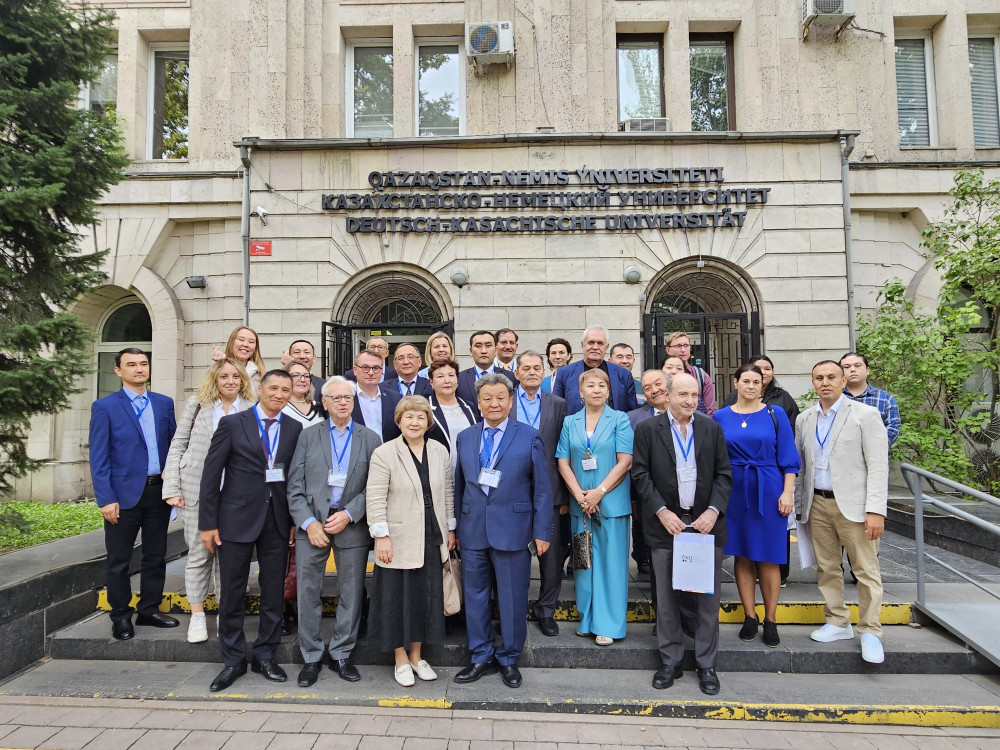
On September 5, 2024, the XII Kazakh-German Logistics Forum took place in Almaty, becoming an important platform for discussing key issues in logistics and transport. This year's forum was dedicated to the theme "Kazakhstan — A Bridge Between Europe and Asia" and brought together experts from various countries who shared their knowledge and experience, presenting projects and solutions for the future development of transport and logistics systems in Central Asia.
The forum was divided into two thematic sessions, each covering relevant aspects of logistics and education in the field. The event was attended by representatives of major international logistics companies, experts from leading academic institutions, and representatives from governmental and international organizations actively working in transport and logistics services.
One of the keynote speakers was Akylbek Umetaliev, Doctor of Economics, Professor, and Director of the International School of Logistics at Kyrgyz State Technical University named after I. Razzakov (KSTU), representing Kyrgyzstan. In his speech, Professor Umetaliev discussed the UniCEN project and the COIL grant received under the IDEAS program. This project focuses on integrating the Kyrgyz educational system into the international community by fostering collaboration with the European Union and the University of Miskolc (Hungary). Professor Umetaliev also emphasized the importance of training young specialists in logistics and stressed that the development of cooperation in the field of education will be the foundation for Kyrgyzstan’s successful integration into global supply chains.
Another important speaker from Kyrgyzstan was Azizbek Kydykov, Associate Professor at KSTU named after I. Razzakov. He delivered a presentation on "Connecting the International Transport Corridors of the Kyrgyz Republic within the 'One Belt, One Road' Program." His talk focused on the importance of integrating Kyrgyzstan's transport infrastructure into global logistics networks and its role in international trade. Kydykov highlighted Kyrgyzstan's participation in the "One Belt, One Road" initiative as crucial for improving transport links and enhancing the efficiency of goods delivery through Central Asia.
The first session of the forum focused on global logistics initiatives, such as the "One Belt, One Road" project, the Trans-Caspian International Transport Route, and the challenges and opportunities within Kazakhstan's transport system. Representatives of major transport organizations in Kazakhstan, along with international experts from Germany, China, and other Central Asian countries, discussed containerization, air freight, and digital solutions in logistics. Special attention was given to transnational cooperation and the introduction of innovative technologies that could improve the efficiency of freight flows between Europe and Asia via Kazakhstan.
The second session centered on education in the field of logistics. Discussions focused on professional and academic training for logistics professionals, as well as the integration of international educational programs. One of the key topics was the dual education system, which allows students to combine theoretical learning with practical work in companies. Participants also discussed new approaches to education, including gamification in logistics training, which can enhance student interest and motivation in the field.
The forum became a vital platform for exchanging ideas and innovations aimed at improving the efficiency of the region’s transport and logistics infrastructure. Participants agreed that further development of logistics corridors and the enhancement of educational programs would be crucial steps in strengthening Kazakhstan's role as a strategic bridge between Europe and Asia.
Presentations were made by: